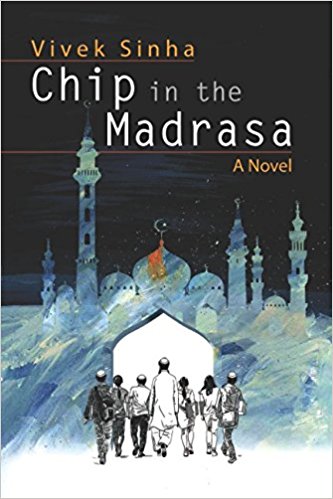The phrase ‘communal tension’ is perceived as a tautness between Hindu and the Muslim in today’s polity of polarization. This association, by default, means the word communal is often painted with the ‘Hindu-Muslim color’. Though the word ‘communal’ denotes collective commonality of the lives of groups of people, it has somehow become synonymous with establishing the discords and differences between different groups, more so between different religions.
Chip in the Madrasa is a realistic reflection or even a rejoinder to this dominant din where real issues of communal dissent within the Muslim community are lost in the mire of rabid religiosity where few radicals have hijacked the discourse. The Novel is an offbeat story of the struggles of an average Muslim who has to fight his own clan to find his voice.
Maulvi sahab is a pious and educated man in a quaint little village called Basera. The story of Chip in the Madrasa revolves around Maulvi sahab’s dream and his struggle to modernize the village madrasa, which is met with stiff opposition by powerful forces that he is totally unaware of.
Vivek Sinha’s lucid and engaging narration takes you into the dusty lanes of Basera making you a part of all that rusticity as you listen curiously to the village gossip under the huge banyan tree, while cringing in fear and disgust as a gullible Heena and Fawzia are exploited as sex slaves. There is a subtle play of emotions, values, relationships and commitment as against blatant evil of vicious political ambitions, deceit, obnoxious lust and betrayal.
While there are many books and movies out there, telling you about how a Muslim is a victim of marginalization, Chip in the Madrasa is a bold attempt that brings out the duplicity of the radical religiosity within the Islamic folds that cries victimhood of marginalization while crushing all reforms at the same time. It also deftly juxtaposes how the vulnerable Muslim identity is often accentuated and abused for the spoils of power, and yet the Muslim masses iconize these power-brokers.
Haider, who goes on to become a Maulvi of the masses tries his best to lay bare the motives behind those dreadful Islamic dogmas and religious sermons that would clog the minds of an entire Muslim community. Abdul, his son, stands by his aging father to leash and lacerate this radical grip from the Muslim psyche. But the money from Saudi Arabia has successfully brewed an atmosphere of hate and closed the minds of several Muslims in Basera. It is one man’s consistent struggle to hold a discerning mirror into all that goes into the making of a marginalized minority status where Muslims are fed with the victimization theory.
Maulvi sahab has put his entire life, all his savings and everything at stake for a better Basera, but a womanizer Maulana Kamran’s vicious Wahhabi propaganda has turned around the tides and his cronies were fast coming for him. Will the people who believed and respect Maulvi sahab’s teachings stand by him in this hour of need or will they let the pseudo Maulanas and Muftis to haunt their souls beneath the veil of darkness in their cloaked minds? Will Maulvi sahab ever realize his dream of a modernized madrasa? Go grab a copy as this is one debut novel that makes for a flowing read with a curious mix of power, polarization and philanthropy.
Chip in the Madrasa is available across Amazon online stores and on Flipkart.
